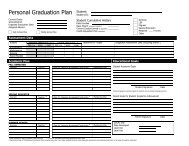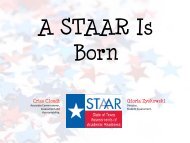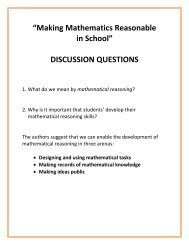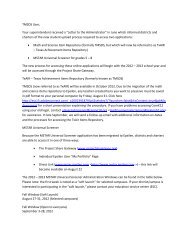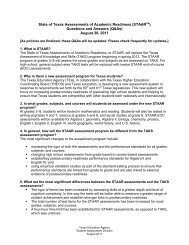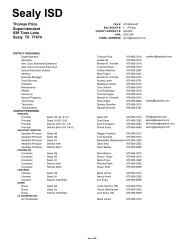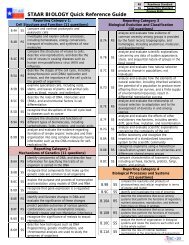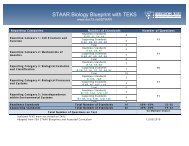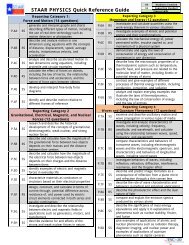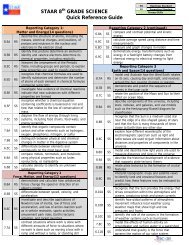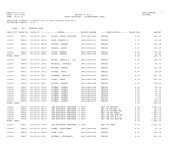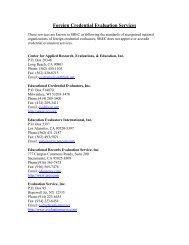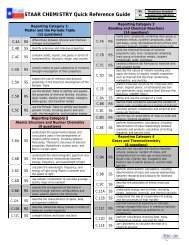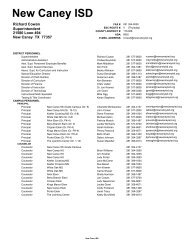Brochure - Texas Center for Learning Disabilities
Brochure - Texas Center for Learning Disabilities
Brochure - Texas Center for Learning Disabilities
You also want an ePaper? Increase the reach of your titles
YUMPU automatically turns print PDFs into web optimized ePapers that Google loves.
The earlier, the better.<br />
When students display risk <strong>for</strong> learning disabilities<br />
or academic and behavioral difficulties,<br />
identification models must enable educators<br />
to intervene as early as possible. Students who<br />
do not respond as expected to these early<br />
interventions should then, if appropriate, receive<br />
more intensive remedial interventions.<br />
Response to intervention models integrate<br />
prevention and remediation.<br />
Our completed research projects, conducted<br />
from 2006 to 2011, included the following:<br />
• Classification. This series of studies focused<br />
on examining alternatives <strong>for</strong> identifying<br />
students as being learning disabled, using<br />
response to intervention (RTI) to make<br />
instructional decisions, and developing tools<br />
to measure student progress.<br />
• Early Intervention. This project focused on<br />
the instructional aspects of RTI, specifically<br />
the effect of moderately intense levels of<br />
intervention on the reading achievement of<br />
students at risk <strong>for</strong> reading problems in first<br />
through third grades.<br />
• Remediation. This project focused on<br />
the implementation and effect of RTI with<br />
students in sixth through eighth grades by<br />
developing and field-testing screening and<br />
progress-monitoring measures and examining<br />
secondary and tertiary interventions.<br />
• Magnetic Source Imaging. This project<br />
used magnetic source imaging to investigate<br />
brain activation profiles associated with<br />
different subtypes of poor readers and with<br />
different response to interventions.<br />
For more in<strong>for</strong>mation on the <strong>Texas</strong> <strong>Center</strong> <strong>for</strong><br />
<strong>Learning</strong> <strong>Disabilities</strong>, please see our website at<br />
www.texasldcenter.org.<br />
The website provides more detailed in<strong>for</strong>mation<br />
about our research, presentations and papers by<br />
center staff members, videos of effective instruction,<br />
and an online library containing useful<br />
resources related to response to intervention.<br />
Examples of lesson plans and assessments used<br />
in our research are also available <strong>for</strong> download.<br />
Investigating the<br />
Classification,<br />
Intervention,<br />
and<br />
Remediation of<br />
<strong>Learning</strong> <strong>Disabilities</strong>
Who We Are<br />
The <strong>Texas</strong> <strong>Center</strong> <strong>for</strong> <strong>Learning</strong> <strong>Disabilities</strong> (TCLD)<br />
conducts research that leads to a more comprehensive<br />
understanding of the following:<br />
• Reliable and valid classifications of learning<br />
disabilities, with direct implications <strong>for</strong> identification<br />
of students with significant reading<br />
disabilities, including models that incorporate<br />
response to intervention (RTI)<br />
• The role of executive functions in reading<br />
comprehension and other academic skills<br />
• Effective interventions and RTI <strong>for</strong> students<br />
at risk <strong>for</strong> or experiencing serious reading<br />
difficulties<br />
• The neural correlates of reading disabilities<br />
in children<br />
Through rigorous methodology, TCLD critically<br />
evaluates an RTI framework as a potential classification<br />
model of learning disabilities.<br />
Integrating cognitive, neural, and instructional<br />
components of RTI models, this multidisciplinary<br />
research provides educators with in<strong>for</strong>mation<br />
about effectively intervening with young students<br />
with a range of reading difficulties, including<br />
students with learning disabilities and those<br />
at risk <strong>for</strong> learning disabilities.<br />
In addition, TCLD develops screening and diagnostic<br />
procedures <strong>for</strong> identifying struggling readers<br />
in middle school.<br />
Research sites include the University of Houston,<br />
The University of <strong>Texas</strong> at Austin, The University<br />
of <strong>Texas</strong> Health Science <strong>Center</strong> at Houston, and<br />
St. Louis University.<br />
Classification, Definition, and Integration of<br />
<strong>Learning</strong> <strong>Disabilities</strong> Research<br />
Led by:<br />
Dr. Karla K. Stuebing (University of Houston )<br />
Research:<br />
Identifying individual children who meet criteria <strong>for</strong> learning<br />
disabilities has plagued research and practice since the<br />
origin of the concept of learning disabilities. In this project,<br />
we leverage the special statistical and clinical expertise<br />
of our team and advances in statistical computing and<br />
analytic models, simulation, and meta-analysis to continue<br />
and extend a long history of research on the classification<br />
and definition of learning disabilities, evaluating the reliability<br />
of different approaches to identification; the validity<br />
of classifications based on intervention response; and the<br />
integration of research on classification, executive functions,<br />
and intervention.<br />
Development of a Framework <strong>for</strong> Executive<br />
Functions in the Context of Reading<br />
Comprehension Skills and Difficulties<br />
Led by:<br />
Dr. Paul T. Cirino (University of Houston)<br />
Research:<br />
Executive functions are conceptualized in different, yet<br />
overlapping ways in the neuropsychological, cognitive,<br />
and educational literatures, and executive functions have<br />
a robust relationship to reading comprehension and other<br />
academic skills. This project is designed to clarify the<br />
structure of executive functions, determine the relevance<br />
of that structure to reading comprehension and other academic<br />
skills, and evaluate how to most effectively integrate<br />
executive functions into remedial reading comprehension<br />
interventions.<br />
Integrating Executive Functioning Into<br />
Remediation of Students With Reading<br />
<strong>Disabilities</strong><br />
Led by:<br />
Dr. Sharon Vaughn (The University of <strong>Texas</strong> at Austin)<br />
Research:<br />
Our intention is to improve scientific knowledge and clinical<br />
practice regarding effective instruction <strong>for</strong> remediating<br />
reading comprehension difficulties <strong>for</strong> students in the<br />
middle grades (grades 4 and 5) and to link with previous<br />
studies that begin in grade 6. It is not clear why reading<br />
interventions are less efficacious in secondary environments,<br />
and the lack of attention to grades 4–5 is a major<br />
gap in knowledge and practice. Through clinical trials<br />
designed to scientifically determine the efficacy of conceptually<br />
designed treatments capitalizing on recent research<br />
on reading comprehension, language, and self-regulation,<br />
we hope to increase the overall impact of intervention on<br />
reading comprehension outcomes <strong>for</strong> students.<br />
Neural Correlates of Reading Comprehension<br />
in Typical and Struggling Readers<br />
Led by:<br />
Dr. Jenifer Juranek (The University of <strong>Texas</strong> Medical School<br />
at Houston)<br />
Research:<br />
Growing evidence from multimodal brain-imaging studies<br />
highlights the importance of a synergistic approach toward<br />
characterizing the neurobiological substrate of reading disability.<br />
The overall goal of this project is to develop a comprehensive<br />
neurobiological model of text comprehension<br />
that will supplement the cognitive framework developed<br />
<strong>for</strong> the Executive Functions project (description at left). We<br />
will evaluate features of brain organization associated with<br />
developmental outcomes of educational interventions addressed<br />
in our Intervention project (description above).<br />
Why We Are Needed<br />
Four consensus reports 1 conclude<br />
that improving the identification<br />
and treatment of students with<br />
learning disabilities is central to<br />
re<strong>for</strong>m in both general education<br />
and special education.<br />
Recent reports highlight the following issues<br />
with learning disabilities classification:<br />
• Inadequate instruction. Many students<br />
identified <strong>for</strong> special education may not have<br />
received adequate reading instruction in the<br />
general education classroom, suggesting<br />
that the number of individuals identified with<br />
learning disabilities may be inflated. Improving<br />
reading instruction in general education<br />
may reduce this number.<br />
• Inconsistent identification. Current regulations<br />
<strong>for</strong> the identification of learning disabilities<br />
in the Individuals With <strong>Disabilities</strong><br />
Education Act lack a research base. This lack of<br />
research impedes progress in the implementation<br />
of effective instructional approaches <strong>for</strong><br />
students with disabilities. Thus, the need <strong>for</strong><br />
research on alternative models <strong>for</strong> the identification<br />
and treatment of learning disabilities<br />
is clear.<br />
1 ”Minority Students in Special and Gifted Education” (Donovan<br />
& Cross, 2002); “Rethinking Special Education <strong>for</strong> a New Century”<br />
(Finn, Rotherham, & Hokanson, 2001); “Identification of <strong>Learning</strong><br />
<strong>Disabilities</strong>: Research to Practice” (Bradley, Danielson, & Hallahan,<br />
2002); “President’s Commission on Excellence in Special Education<br />
Report” (2002).



